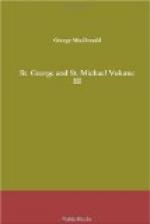One of their number, a little in the rear, supposing Richard to be one of themselves, allowed him to get ahead of him, and, facing about, cut him off from his companions. It was the second time he had headed Scudamore, and again he did not know him, this time because it was dark. Rowland, however, recognised his voice as he called him to surrender, and rushed fiercely at him. But scarcely had they met, when the cavalier, whose little strength had ere this all but given way to the unwonted fatigue, was suddenly overcome with faintness, and dropped from his horse. Richard got down, lifted him, laid him across Lady’s shoulders, mounted, raised him into a better position, and, leading the other horse, brought him back to the inn. There first he discovered that he was his prisoner whom he feared he had killed at Naseby.
When Rowland came to himself,
‘Are you able to ride a few miles, Mr Scudamore?’ asked Richard.
At first Rowland was too much chagrined, finding in whose power he was, to answer.
‘I am your prisoner,’ he said at length. ’You are my evil genius, I think. I have no choice. Thy star is in the ascendant, and mine has been going down ever since first I met thee, Richard Heywood.’
Richard attempted no reply, but got Rowland’s horse, and assisted him to mount.
‘I want to do you a good turn, Mr Scudamore,’ he said, after they had ridden a mile in silence.
‘I look for nothing good at thy hand,’ said Scudamore.
’When thou findest what it is, I trust thou wilt change thy thought of me, Mr Scudamore.’
‘Sir Rowland, an’ it please you,’ said the prisoner, his boyish vanity roused by misfortune, and passing itself upon him for dignity.
‘Mere ignorance must be pardoned, sir Rowland,’ returned Richard: ’I was unaware of your dignity. But think you, sir Rowland, you do well to ride on such rough errands, while yet not recovered, as is but too plain to see, from former wounds?’
’It seems not, Mr. Heywood, for I had not else been your prize, I trust. The wound I caught at Naseby has cost the king a soldier, I fear.’
’I hope it will cost no more than is already paid. Men must fight, it seems, but I for one would gladly repair, an’ I might, what injuries I had been compelled to cause.’
‘I cannot say the like on my part,’ returned sir Rowland. ’I would I had slain thee!’
’So would not I concerning thee—in proof whereof do I now lead thee to the best leech I know—one who brought me back from death’s door, when through thee, if not by thy hand, I was sore wounded. With her, as my prisoner, I shall leave thee. Seek not to make thy escape, lest, being a witch, as they saw of her, she chain thee up in alabaster. When thou art restored, go thy way whither thou pleasest. It is no longer as it was with the cause of liberty: a soldier of hers may now afford to release an enemy for whom he has a friendship.’




